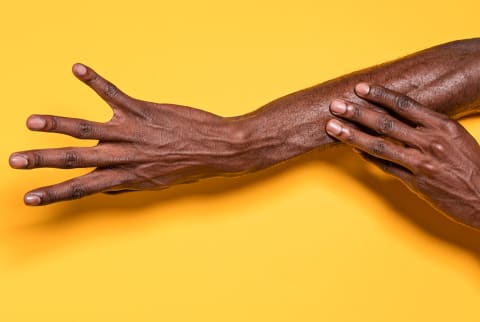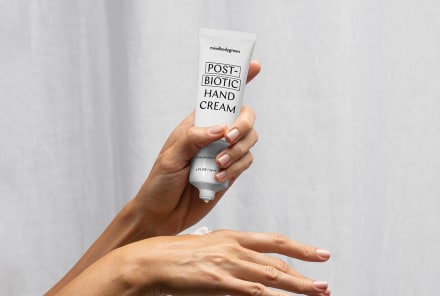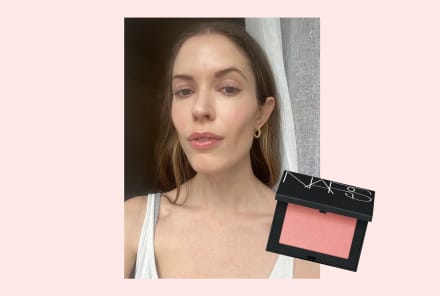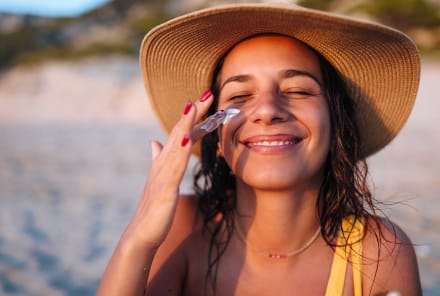Advertisement
Hand Eczema: How To Relieve Your Symptoms & Prevent Flare-Ups


For those with eczema, you likely know it can pop up in the most frustrating of places. There's the oft-cited dandruff (a mild form of eczema) that peppers your scalp with oily, white flakes. There's contact dermatitis, which can happen anywhere, from interacting with triggering ingredients. There's perioral dermatitis that leaves your lips cracked and dry. Then, of course, you can see eczema patches popping up all over the body—one common area being your hands.
And if you've experienced a flare-up, you likely know how painful, itchy, and annoying it is to deal with considering how much we all use our hands on a daily basis. It's not an area you can tuck under clothing and try to forget about for a while—you're forced to deal with flare-ups head (or hand) on.
So if you get bouts of eczema in the area, here's what to do.
What is hand eczema?
"Hand eczema, or hand dermatitis, is characterized by redness, blistering, cracking, flaking and itching of the palms and fingers," says board-certified dermatologist Hadley King, M.D. Essentially, it's the same flare-ups you may get on your face or elsewhere on your body, just localized to the fingers and palms of your hands. You may just notice it more because of how often you use your digits: Typing away at a laptop with cracked fingers or doing handiwork with raw palms is, uh, not ideal.
What causes eczema in this area?
Often, flare-ups are triggered by what we come into contact with. And the thing is your hands, they come into contact with a lot, some likely questionable or irritating.
Even basic hygiene things can set it off: "It is often exacerbated by hand-washing because water is very drying to the skin and causes irritant contact dermatitis. Detergents and other irritating ingredients like alcohol in hand sanitizers can also contribute," says King. "It's honestly very common because we generally wash our hands more than other areas."
But you may be wondering, why do my hands crack and dry when others don't after doing the same thing? "Eczema found on the hands is triggered by genetics and environmental factors. Then contact allergens and irritants can further exacerbate eczema on the hands," says Josie Holes, an esthetician at SKINNEY Medspa in NYC. Essentially, some of us are simply genetically predisposed to have flare-ups.
How you relieve the symptoms and prevent flare-ups.
So, there is no "cure" for eczema at the moment—but there are ways to manage symptoms and help prevent it from getting too unbearable:
Be mindful of your soap and sanitizer.
So, for personal hygiene reasons, we know we need to wash regularly and use hand sanitizer. This is nonnegotiable. However, this can be extremely harsh on already sensitive skin. "Minimize contact with other potentially drying and irritating ingredients as well, such as alcohol in hand sanitizers and detergents and hand soap," says King. Instead, find sanitizers buffered with hydrating ingredients like glycerin or aloe vera. As for hand soaps, find options that don't contain too harsh of surfactants and are blended with soothing, creamy ingredients like colloidal oat or butters.
Use a hand cream after every wash.
So, of course we must wash our hands; however, you can be smart about the ways you care for your skin after washing. The simplest way? Apply a hand cream straight away—and look for one with simple, nonirritating ingredients, of course.
"It's essential to moisturize as often as possible to restore those lipids and encourage the regrowth of healthy bacteria," board-certified dermatologist Whitney Bowe, M.D., previously told us about caring for your hands post-wash. "I carry a hand moisturizer with me at all times and apply it within moments of washing or sanitizing my hands throughout the day. If you wait too long, you miss that narrow window of opportunity to really trap and seal those nourishing ingredients in the skin before all the water evaporates off the surface, further compromising your skin."
In general: Moisturize, moisturize, moisturize!
This is the best way you are going to keep flare-ups in the area at bay. By keeping the area hydrated, you're better supporting your skin barrier function. (See, eczema is, by its nature, a compromised skin barrier.)
Looking for a good moisturizer? Here's a tip from King: "Moisturizers ideally contain three components: humectants, emollients, and occlusives. Humectants, like hyaluronic acid and glycerin, are mostly low-molecular-weight substances that bind water into the stratum corneum. Emollients, like squalene, fatty acids, and ceramides, help in skin barrier function leading to overall improvement in skin texture and appearance. Finally, occlusives are oils and waxes that form an inert layer on the skin and physically block transepidermal water loss. Examples include beeswax and lanolin."
If you're growing weary of applying creams all day, you can also do much of the heavy lifting while you sleep: "Sleeping with a thick moisturizer under white cotton gloves is a great way to moisturize," says King.
Wear gloves when you do labor or housework.
A practical lesson, but gloves can keep you protected from a variety of irritants like cleaning products, too hot water, and physical wear and tear. Since eczema is triggered by irritation to the area, keeping the skin protected while working will help alleviate some of the problem.
You should especially wear gloves if your job is one where you experience irritants frequently: "Hand eczema is commonly found in workers who constantly use their hands such as hairdressers and cleaning, catering, and mechanical workers," says Holes.
Understand that sometimes flare-ups just happen.
"I think most people think that if they work really hard at it—skin moisturization, diet change, allergen avoidance—they can control eczema and eliminate flare-ups," double-board-certified dermatologist Latanya Benjamin, M.D., previously explained to us about eczema. "Initially, I teach my families to expect occasional flare-ups, despite their best care. Even when the skin is under better control, eczema can still flare for many reasons, including catching a common cold or battling a skin infection."
Watch Next
Enjoy some of our favorite clips from classes
Enjoy some of our favorite clips from classes
What Is Meditation?
Mindfulness/Spirituality | Light Watkins
Box Breathing
Mindfulness/Spirituality | Gwen Dittmar
What Breathwork Can Address
Mindfulness/Spirituality | Gwen Dittmar
The 8 Limbs of Yoga - What is Asana?
Yoga | Caley Alyssa
Two Standing Postures to Open Up Tight Hips
Yoga | Caley Alyssa
How Plants Can Optimize Athletic Performance
Nutrition | Rich Roll
What to Eat Before a Workout
Nutrition | Rich Roll
How Ayurveda Helps Us Navigate Modern Life
Nutrition | Sahara Rose
Messages About Love & Relationships
Love & Relationships | Esther Perel
Love Languages
Love & Relationships | Esther Perel

















